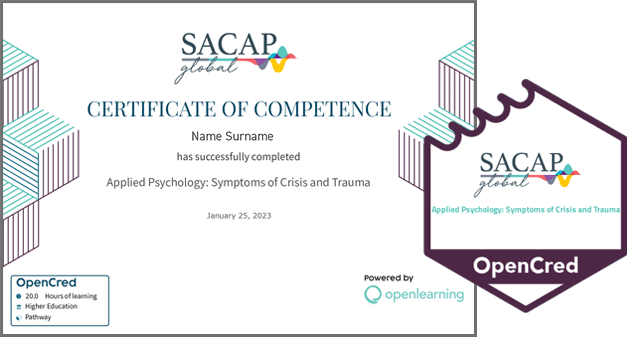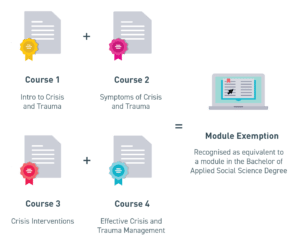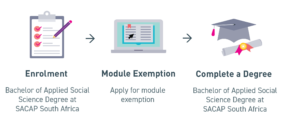Symptoms of Crisis & Trauma
R 1,540.00

Take the Course
Symptoms of Crisis & TraumaR 1,540.00
Details
Start Date
12 May 2025End Date
25 May 2025duration
2 weeks-
 Register now. Pay later. 0% Interest.Split into interest free payments.
Register now. Pay later. 0% Interest.Split into interest free payments. -
 Scan to pay.Scan the QR code to pay.
Scan to pay.Scan the QR code to pay. -

 Credit and debit card.Pay using your credit or debit card.
Credit and debit card.Pay using your credit or debit card. -
 Visa Click to Pay.Pay with credit, debit or prepaid card.
Visa Click to Pay.Pay with credit, debit or prepaid card.
Course Overview
Any emotional and physically traumatic experience can have a disruptive effect on a person’s sense of contentment and wellbeing. The immediate or delayed symptoms of trauma can go unnoticed, leaving the traumatised person disoriented and isolated.
The Symptoms of Crisis & Trauma micro-credential will help you gain a better understanding of the immediate and long-term effects of trauma.
This 2-week introductory course explores the complex array of symptoms associated with trauma to help those who have experienced crises and trauma in their lives. Crises such as natural disasters, acts of violence, and car accidents can all be traumatic.
This course will highlight how the effect of a traumatic event is dependent on many factors, including characteristics of the individual, the type and characteristics of the event(s), developmental processes, the meaning of the trauma, and related socio-cultural factors.
Time commitment per week
An average of 10 – 13 hours weekly.
Is this course for you?
This course is for you if you want to gain a better understanding of emotional and physical reactions to trauma.
What is Crisis and Trauma?
The Cambridge Dictionary defines crisis as “an extremely difficult or dangerous point”. It therefore originates from a specific time or event. Trauma on the other hand is defined by the Cambridge Dictionary as a “severe and lasting emotional shock and pain caused by an extremely upsetting experience.”
For more information on how to deal with crisis and trauma read our blog post.
Dates
- Class of 2025 May: 12 May – 25 May
- Class of 2025 August: 11 August – 24 August
- Class of 2025 October: 6 October – 19 October
- Class of 2025 November: 3 November – 16 November
There are no online classes. Course content is released on a weekly basis. This will allow you to work through the course material at a time that is most convenient for you, while still meeting the weekly targets on time.
Learner Experience
Certification
Upon completion, you will receive a digital certificate of competence and badge. Your certificate and badge can be shared on 100+ social media platforms, allowing you to share your achievement with a single click.

Credential Type
The OpenLearning team has reviewed this course to ensure quality academic learning within the Malaysian and Australian credentialing framework.
An OpenLearning OpenCred is a type of credential that can stand-alone or interact with a formal qualification. OpenCred courses are market-leading online courses aimed at preparing learners for the future of work.
This course has been designed and developed by experts in the field of psychology. The Symptoms of Crisis and Trauma micro-credential is for anyone needing to upskill in this area and offers 20 hours of indispensable learning and assessment.
Learners study online with peers and receive robust academic content while acquiring practical industry-relevant skills.
OpenCreds
Completing this course leads to obtaining an OpenCred.
- 20 hours of learning
- OpenCred classification: Pathway
Stackable Credentials
Stack specified combinations of micro-credentials and they can be recognised as equivalent to a module within the Bachelor of Applied Social Science Degree at SACAP.
Intro to Crisis & Trauma can be stacked with Symptoms of Crisis & Trauma and Crisis Interventions and Effective Crisis & Trauma Management, and if you meet the minimum entrance criteria, you can enrol for the Bachelor of Applied Social Science Degree and apply for module exemption.
What You’ll Need
- Access to Microsoft Word
- Google Chrome (recommended)
- Stable internet connection
What You’ll Learn
Over the course of two (2) weeks, through videos, readings and discussions, you will explore the following topics:
- Common reactions to trauma across domains (emotional, physical, cognitive, behavioural, social, and developmental) that can be associated with singular, multiple, and enduring traumatic events.
- Common diagnoses associated with trauma: Post Traumatic Stress Disorder (PTSD) and Acute Stress Disorder (ASD).
- How experiences of trauma can become associated with the onset of other trauma-related mental disorders with particular emphasis on the problem of related substance abuse.
- The impact and experience of trauma from a cross-cultural perspective.
- The delayed responses of trauma.
- Analyse a case study and review the symptoms of crisis and trauma that were explored throughout this course.
Course Outcomes
By the end of this course, you will be able to:
- Discuss traumatic stress symptoms (emotional, physical, cognitive, behavioural, social, and developmental).
- Understand links between traumatic stress symptoms across various domains of human functioning.
- Examine specific Trauma-related Psychological Disorders.
- Explain other Trauma-related and Co-occurring disorders.
- Explore cross-cultural interpretations of PTSD.
You will have also created an invaluable portfolio of evidence, which you can use to demonstrate your understanding and knowledge of the complex array of symptoms associated with trauma.
The Team
Our short course developers and assessors are expert practitioners. They have been specifically selected for the breadth and depth of experience they possess in their respective disciplines. The team loves sharing their knowledge and online learning expertise to ensure that you get the most out of your learning journey.

Understand common reactions to trauma.
Discover how experiences of trauma can become associated with the onset of trauma-related mental disorders.
Evaluate the most common diagnoses associated with trauma.







